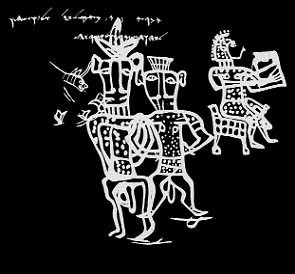First of all, Shemot is fascinating for a few reasons. First, the origin of the name 'Moshe', derived, so the text tells us, from 'Min hamayim mishiteehu' or 'I drew him from the water'. So an Egyptian princess, it seems spoke perfect Hebrew. But shouldn't he have been named at his Brit Mila? And shouldn't we have been told what that name was? Josh Waxman on parshablog insists that the definition provided in the text for his name is correct, grammatical contortions notwithstanding, and in any case is better than the alternatives. One of these is 'Moseh', an Egyptian word meaning 'is born', and appended to the name of many Egyptian kings such as Thutmoseh and Ramoseh. Sounds most likely to me, but I guess I don't have a frum agenda.
There is also an interesting reference to 'Bayamim harabim hahem' (roughly 'those many days ago') which of course implies that the text was written many years after the events.
Finally, Shemot seems to be a rich vein for documentary hypotheses research. In the first two chapters god is called 'Elohim' while Tzipora's Midianite father is called Reuel (notice the typically Hebrew 'el' in his name, which means 'see el'). Then in Chapter 3, the YHVH name appears and Reuel is now known as Yitro. Space and audience attention span grow short. The multitudes of readers must get back to work. I welcome all insights on these issues.

Today in 1493: The Jews were expelled from Sicily. The island had been under Spanish control for 81 years. This ancient community had flourished on the island since before the appearance of Christianity, through the Muslim and Norman periods, never suffering the degradations of Jewish communities elsewhere in Europe. They possessed a rich liturgical tradition and even had a university.
But 514 years ago today they were sent off in ships, as their long-time neighbors waved goodbye from Palermo's rooftops. Of course, before departure the crown forced them to pay an extortionate tax, as a sort of going away gift.
Shabbat Shalom.


